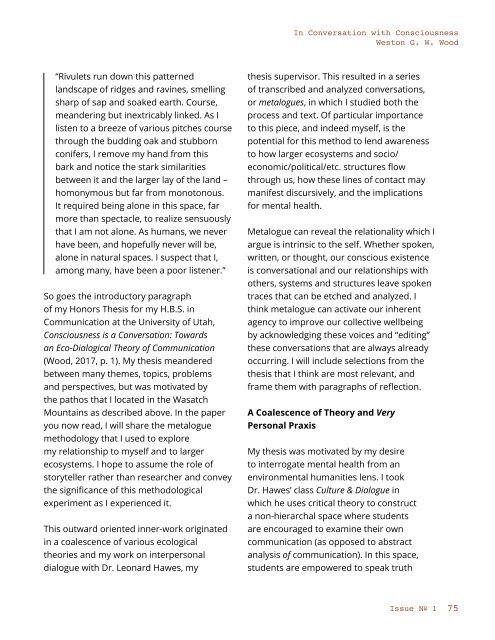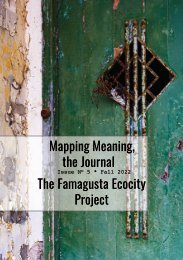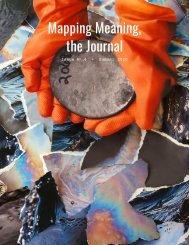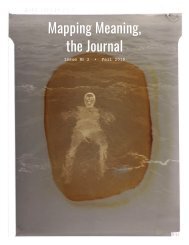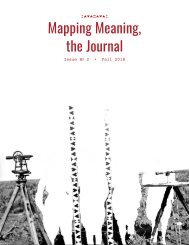Mapping Meaning, the Journal (Issue No. 1)
Create successful ePaper yourself
Turn your PDF publications into a flip-book with our unique Google optimized e-Paper software.
In Conversation with Consciousness<br />
Weston G. W. Wood<br />
“Rivulets run down this patterned<br />
landscape of ridges and ravines, smelling<br />
sharp of sap and soaked earth. Course,<br />
meandering but inextricably linked. As I<br />
listen to a breeze of various pitches course<br />
through <strong>the</strong> budding oak and stubborn<br />
conifers, I remove my hand from this<br />
bark and notice <strong>the</strong> stark similarities<br />
between it and <strong>the</strong> larger lay of <strong>the</strong> land –<br />
homonymous but far from monotonous.<br />
It required being alone in this space, far<br />
more than spectacle, to realize sensuously<br />
that I am not alone. As humans, we never<br />
have been, and hopefully never will be,<br />
alone in natural spaces. I suspect that I,<br />
among many, have been a poor listener.”<br />
So goes <strong>the</strong> introductory paragraph<br />
of my Honors Thesis for my H.B.S. in<br />
Communication at <strong>the</strong> University of Utah,<br />
Consciousness is a Conversation: Towards<br />
an Eco-Dialogical Theory of Communication<br />
(Wood, 2017, p. 1). My <strong>the</strong>sis meandered<br />
between many <strong>the</strong>mes, topics, problems<br />
and perspectives, but was motivated by<br />
<strong>the</strong> pathos that I located in <strong>the</strong> Wasatch<br />
Mountains as described above. In <strong>the</strong> paper<br />
you now read, I will share <strong>the</strong> metalogue<br />
methodology that I used to explore<br />
my relationship to myself and to larger<br />
ecosystems. I hope to assume <strong>the</strong> role of<br />
storyteller ra<strong>the</strong>r than researcher and convey<br />
<strong>the</strong> significance of this methodological<br />
experiment as I experienced it.<br />
This outward oriented inner-work originated<br />
in a coalescence of various ecological<br />
<strong>the</strong>ories and my work on interpersonal<br />
dialogue with Dr. Leonard Hawes, my<br />
<strong>the</strong>sis supervisor. This resulted in a series<br />
of transcribed and analyzed conversations,<br />
or metalogues, in which I studied both <strong>the</strong><br />
process and text. Of particular importance<br />
to this piece, and indeed myself, is <strong>the</strong><br />
potential for this method to lend awareness<br />
to how larger ecosystems and socio/<br />
economic/political/etc. structures flow<br />
through us, how <strong>the</strong>se lines of contact may<br />
manifest discursively, and <strong>the</strong> implications<br />
for mental health.<br />
Metalogue can reveal <strong>the</strong> relationality which I<br />
argue is intrinsic to <strong>the</strong> self. Whe<strong>the</strong>r spoken,<br />
written, or thought, our conscious existence<br />
is conversational and our relationships with<br />
o<strong>the</strong>rs, systems and structures leave spoken<br />
traces that can be etched and analyzed. I<br />
think metalogue can activate our inherent<br />
agency to improve our collective wellbeing<br />
by acknowledging <strong>the</strong>se voices and “editing”<br />
<strong>the</strong>se conversations that are always already<br />
occurring. I will include selections from <strong>the</strong><br />
<strong>the</strong>sis that I think are most relevant, and<br />
frame <strong>the</strong>m with paragraphs of reflection.<br />
A Coalescence of Theory and Very<br />
Personal Praxis<br />
My <strong>the</strong>sis was motivated by my desire<br />
to interrogate mental health from an<br />
environmental humanities lens. I took<br />
Dr. Hawes’ class Culture & Dialogue in<br />
which he uses critical <strong>the</strong>ory to construct<br />
a non-hierarchal space where students<br />
are encouraged to examine <strong>the</strong>ir own<br />
communication (as opposed to abstract<br />
analysis of communication). In this space,<br />
students are empowered to speak truth<br />
<strong>Issue</strong> N o 1<br />
75


